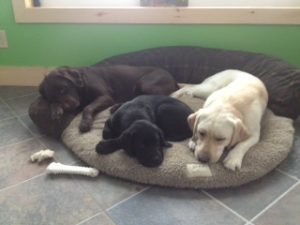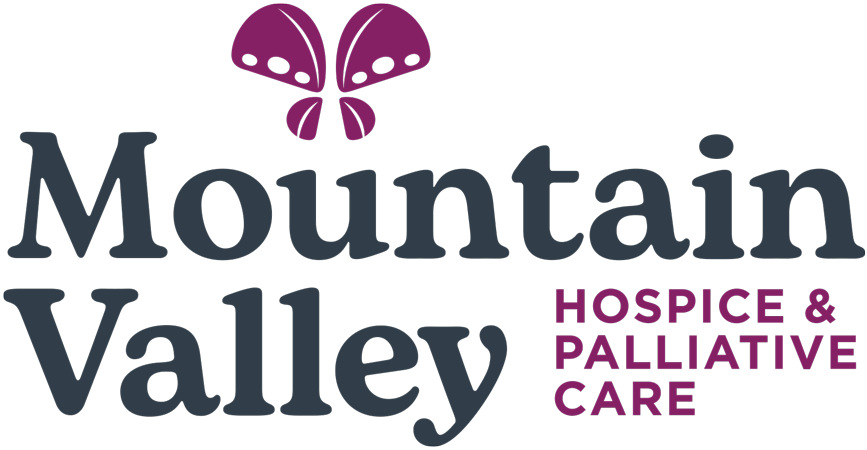By Kara Ulasewicz-Travis, President/CEO, Mountain Valley Hospice

Abi was sick.
Friends would visit and say, “Wow. She’s really thin.”
We did x-rays and blood tests and biopsies.
I tried to hug it out of her. I prayed. It bought us a few months.
She stopped swimming and running, but she’d still catch the ball if you threw it right to her.
Her sisters knew. They stayed close and paid a lot of attention.
Now friends would visit, and she wouldn’t leave our bedroom to greet them.
Her breathing became labored, and she couldn’t get comfortable.
We went to the doctor on a Thursday.
They said it was a tumor pushing on her heart. It was inoperable. We were near crisis. We needed to address it that weekend.
“That weekend.” Disbelief. Validation. Devastation. But some control. Because it was for us to address.
We knew. Her sisters knew. Our friends and family knew.
She was valiantly brave and stoic, but she was suffering.
And then our entire experience shifted with three words of advice: Call Dr. Roger.
He will come to your house. He will put you at ease with her disease. He will give you time and space and comfort of surroundings. He is truly unique.
I made the call after much debate and deep knowing despite the frayed fringes of denial. We were still in control.
A soothing, sympathetic voice that was still firm and professional. Best not wait to avoid crisis.
What about her sisters? They are inseparable, especially the youngest.
What about my husband who hasn’t been at the appointments and harbors a kernel of doubt? How do we know it’s the right time?
Again, empathy, questions followed by answers, assurance.
We made an appointment for the following afternoon. 24 hours. To love. To pray. To doubt. To say good-bye.
What does it mean when you when you know exactly when someone is going to die? We usually don’t. But we had a date and a time.
How do you navigate the emotions of making powerful decisions for a sick loved one who can’t speak for themself?
Dr. Roger knew we were doubting and suffering, and called us the night before to confirm and reaffirm. He would see us the next afternoon. We were doing the right thing.
Dr. Roger drove a Honda. He wore shorts, a polo shirt, and very white sneakers. He carried a black doctor’s bag. He looked normal. But how could he be?
We all went out to meet him in the driveway – Abi, her sisters, my husband, me.
Dr. Roger shook hands and immediately gave his attention to Abi – lovingly and sincerely.
He said he’d perform an exam, but before that, he looked my husband directly in the eyes and said firmly but with sympathy, “Abi looks very sick.”
Thank you. We needed that.
We walked up to our sprawling porch, a favorite spot for all of us.
Abi’s sisters went inside so we could talk. Dr. Roger explained his process and that we would take all the time we needed. There was no rush.
It was hot in the afternoon sun, so we decided to stick with the porch because there was shade and a view of Abi’s favorite tree.
Dr. Roger gave Abi a cookie. He performed the exam and confirmed what we already knew. He told us we were doing the right thing.
He took an imprint of Abi’s foot so we could have it as a keepsake. He took a lock of her hair and put it in a small bottle for us. Then he pulled a polished rock out of his bag on which Abi’s name was hand-painted. We didn’t know what to think of these momentos, but it seemed thoughtful and detailed. I brought the items in the house, along with glossy colored postcards about dealing with grief and loss for each member of our family, including Abi’s sisters.
I took a deep breath. We didn’t have much time. We had all the time we needed.
Another cookie – one for the road.
An injection for Abi to relax.
A surgical pad under Abi with an explanation of the physical symptoms likely to follow.
My hand never left Abi’s head. I sat right next to her, and Dr. Roger sat next to me. My husband sat nearby on the steps.
“Let me know when.”
We looked at each other. How can this be?
“Ok.”
Another slow injection. Waiting. Waiting. Vital check. Waiting. Vital check. A somber nod from Dr. Roger.
Dr. Roger took a battery-operated doorbell out of his black doctor’s bag and handed it to my husband.
“I’m going to go sit in my car. Take all the time you need with Abi. There’s no rush. Bring her sisters out to see her and say good-bye. Ring the doorbell, and I’ll bring a stretcher and fleece blanket to take Abi with me.”
We sat on our porch in the July splendor and cried. We took our time. It was a blessing.
And that’s when it started to break through my consciousness – my staff do this every day. They answer the phone call of the person who can barely breathe for having to make it.
They mitigate pain and end-of-life symptoms.
They educate families about disease progression.
They support and bolster loved ones making life-changing decisions on behalf of loved ones who can’t speak for themselves.
They empathize.
They honor last wishes and make sure people die where they want because they can’t control when.
And it doesn’t end there. Dr. Roger called that night to see how we were doing.
The next morning, we woke up to an email from Dr. Roger with additional resources for grief management and a message saying that it’s normal if we didn’t sleep much the night before.
A few days later, we got a letter in the mail saying Dr. Roger made a donation in Abi’s name to a local rescue shelter.
Some of you will be offended that I’ve used the loss of a pet to describe pieces of what the Hospice experience can be.
Losing a pet is not the same as losing a person; but until you’ve gone through it personally, it is unexplainable in its grief.
Hospice fails when patients and families find us too late to make an impact. We improve quality of life and assist in achieving personal goals.
We provide resources for the family to financially plan and organize other personal details.
For those to whom faith is important, we support and bolster your spiritual journey and exploration.
We provide caregiver respite and volunteer support for grocery shopping or errands, companionship, and pet therapy.
We offer ancillary services like massage therapy that soothes pain but also allays anxiety.
We focus on symptom management so you can focus on living.
And it’s not just for cancer: heart, renal, pulmonary, dementia, any life-limiting ailment or combination of medical issues.
It costs nothing to call us, other than swallowing the lump in your throat and the doubt in your mind.
And because you may need it without even knowing it, our clinical team will follow each family for over a year after their loss because everyone grieves differently and at their own pace.
I’m still not sure how I feel about having an appointment with death. It’s certainly not a debate we’re going to have here, nor does it have any place in the Hospice philosophy—which is all about living.
What I do know is that it makes a lasting impression to be at home, surrounded by those you choose to have with you, cared for by medical professionals with a rare, beautiful gift most of us don’t have.
Not sterile or impersonal, cold or traumatic.
Instead, warmth, sunshine, leaves, a shady porch, pain made peaceful, hearts broken but held lovingly by those who know how. Held up by those who choose to share that gift with those of us who need it most.
